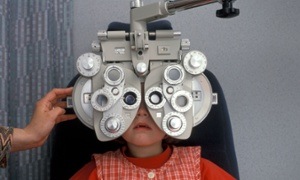
Serious illnesses in vulnerable refugee and migrant children risk going undetected if a New South Wales screening program fails to secure state government funding.
The program, Optimising Health and Learning, is a partnership between schools and health services which screens children who have recently arrived to Australia for health issues that may hamper their education.
The president of the program, Rob Lindsay, said he helped to establish the pilot program in 2011 when he was deputy principal of Menai high school using seed funding of $25,000 from the National Australia Bank’s school grants program.
“It was so successful that in 2013 the project won the NSW premier’s public sector award and the NSW health innovations award,” Lindsay said.
“Despite all this, government funding to secure the sustainability of the project has not been forthcoming and our funding will run out in June.
“Without the project, between 1,000 and 1,200 refugee and vulnerable migrant children will be exited into mainstream high schools each year with an inhibited capacity to learn, because illnesses affecting their learning will not have been detected.”
As part of the program, registered nurses conduct health checks on children attending intensive English language centresin preparation for high school.
About 90% of refugee children and 75% of the migrant children screened through the program had at least one condition that needed treatment, Lindsay said.
“There’s an urban myth out there that health screening of refugee and migrant children is done before or when they get to Australia, but to get a full, comprehensive health screening you have to be over 18,” Lindsay said.
On arrival in Australia students and their families faced language or education barriers to accessing health care, which meant vision and hearing problems, diseases, and iron and vitamin deficiencies went undetected, he said.
The NSW health minister, Jillian Skinner, told Guardian Australia the government recognised the importance of programs for newly arrived refugees and asylum seekers, but stopped short of saying the Optimising Heath and Learning program would be funded.
“The NSW ministry of health is continuing to work … to determine how the Optimising Health and Learning Program can complement the refugee health service in relation to child refugees and asylum seekers,” she said.
Some health screening services are publicly available, but the engagement rate of refugees and vulnerable migrants was only 18%, compared with 100% of children targeted through the program, Lindsay said.
He said after they received treatment, the learning ability and confidence of the students improved drastically.
“A couple of years ago I had some teachers come up to me to say one of their 15-year-old students wasn’t learning, but it turned out he had vision problems and couldn’t see what they were teaching,” Lindsay said.
“We organised some glasses for him and he came up to me one day and told me he had been able to watch a movie for the first time.
“Another child’s teacher said he was out partying all night because he kept falling asleep in class. One day, I saw the child doubled over in pain. It turned out he had an undiagnosed spinal disease that kept him up all night in pain, and he couldn’t sleep.”
A cost analysis of the program conducted by the Centre for Health Economics in 2013 found about 7% of students screened had a hearing impairment significant enough to require a specialist, despite only 4% reporting any problems with their hearing.
The report found many children were unaware they were unwell. Migrant students were significantly less likely than refugee students to have visited a GP since their arrival to Australia, the report found.
Professor David Isaacs, who runs the refugee clinic at the Children’s Hospital at Westmead, said about 50% of children he saw in the clinic were suffering from post-traumatic stress disorder.
“That can be stress related to what they witnessed or endured in their homeland, it can relate to a traumatic journey to Australia on a boat, it can relate to uncertainty about what their families face in future,” Isaacs said.
“If you don’t deal with health problems related to stress, then it can have a lifelong effect on children and will impair their ability to learn, to relate to others and to contribute to society.”
He said the Optimising Heath and Learning program should “absolutely” receive secure state government funding.
“If we just assume everyone is all right once they arrive here then we are in for a rude shock,” he said. “We’ll have traumatised people with unaddressed health problems, which is bad for them, and bad for society.”
